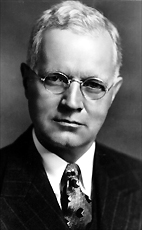Robert James Manion

Robert James Manion, PC , MC (November 19, 1881, Pembroke, Ontario - July 2, 1943, Ottawa) was leader of the Conservative Party of Canada from 1938 until 1940.
Of Irish descent, Manion studied medicine at Queen's University, Kingston, Ontario and at Edinburgh before settling in his hometown of Fort William, Ontario where his parents had lived since 1888. In 1915, he enrolled with the Canadian Army Medical Corps. Attached to the 21st Canadian Battalion, he was awarded the Military Cross for heroism at the battle of Vimy Ridge.
He was elected to the Canadian House of Commons during the conscription election of 1917 as a Unionist Member of Parliament (MP) for Fort William, Ontario. A member of the Liberal Party before the war, Manion remained with the Conservative Party after the war. The new prime minister, Arthur Meighen, appointed him Minister of Soldiers' Civil Re-establishment in 1921. He spent most of the 1920s on the opposition benches , except for a few months in 1926 when he served as a minister in the second Meighen administration, including the position of Postmaster-General.
Following the federal election of 1930, the new Conservative Prime minister R. B. Bennett appointed Manion Minister of Railways and Canals. However, the economic crisis of the Great Depression destroyed the Bennett government, and Manion, with many others, lost his seat in the 1935 election. According to historian Roy Piovesana, Manion's loss was partly attributable to his failure to cultivate his Fort William riding. Despite not having a seat, Manion won the 1938 Conservative leadership convention. Conservative Party members hopes that his Catholicism and marriage to a French-Canadian, Yvonne Desaulniers, would help the party in Quebec where the perception of the Tories as being anti-French and anti-Catholic Orangemen hurt their prospects. Manion entered the House of Commons] through a by-election in 1938. He subsequently campaigned against conscription despite the fact that he had joined the Unionists in 1917 because he favoured the draft.
The defeat of the government of Maurice Duplessis in Quebec hurt Manion's hopes of building an electoral alliance with the conservative premier. As well, his stand against conscription turned much of the Tory base in Ontario against the leader. In the March 1940 general election, Manion's Tories campaigned under the name "National Government" with the platform of forming a wartime coalition government. The renamed Tories were unable to make any gains from their 1935 result, and Manion failed to win his seat, leading to his resignation as party leader two months later. He died three years later, sick and disillusioned.
See also
External links
References
- Manion, R.J. A surgeon in arms. Toronto : McClelland, Goodchild & Stewart, 1918.
- Manion, R.J. Life is an adventure. Toronto : Ryerson Press, 1936.
- Naugler, Harold Adelbert. R.J. Manion and the Conservative Party 1938-1940. M.A. thesis 1966, Queen's University, Kingston, Ont.
- Piovesana, Roy H. Robert J. Manion member of Parliament for Fort William 1917-1935. Thunder Bay : Thunder Bay Historical Museum Society, 1990.
See also
- 1881 births
- 1943 deaths
- Canadian physicians
- Unionist MPs in Canada
- Leaders of the historical Conservative Party of Canada
- Members of the 11th Ministry in Canada
- Members of the 13th Ministry in Canada
- Members of the 15th Ministry in Canada
- Members of the Canadian House of Commons from Ontario
- Canadian Ministers of Railways and Canals
- Members of the Queen's Privy Council for Canada
- Roman Catholic politicians
- Anglo-Irish Canadians
- People from Thunder Bay, Ontario
- Postmasters General of Canada
